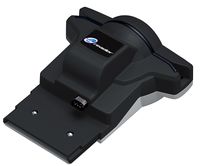Difference between revisions of "E-Reader"
AlexBot2004 (talk | contribs) m (AlexBot2004 moved page Nintendo e-Reader to E-Reader over redirect: Official name is just "e-Reader") |
AlexBot2004 (talk | contribs) m (Displaytitle) |
||
| Line 1: | Line 1: | ||
| + | {{DISPLAYTITLE:e-Reader}} | ||
{{Wrongpage|the peripheral itself|information on the Animal Crossing e-Reader cards|e-Reader card}} | {{Wrongpage|the peripheral itself|information on the Animal Crossing e-Reader cards|e-Reader card}} | ||
{{Infobox System | {{Infobox System | ||
Revision as of 17:09, January 29, 2024
| ||||||
 | ||||||
| Manufacturer | Nintendo | |||||
|---|---|---|---|---|---|---|
| Release date(s) | ||||||
| Media | Game Boy Advance cartridge with built-in link port | |||||
The e-Reader is a gaming peripheral developed by Nintendo for the Game Boy Advance. When paired, it can be used to scan e-Reader cards which have specially encoded data printed on them, to perform various functions such as uploading data or unlocking game features. Some cards may also contain game data to play mini-games or even retro titles such as the ports of NES titles.
e-Reader cards work using Dot Code Technology developed by with Olympus Optical Co., Ltd. Each card can hold up to two code strips, one long strip holding up to 2.2 kilobytes of information and a shorter strip containing 1.4 kilobytes. The e-Reader peripheral itself uses 64 Mb mask ROM and 1 Mb flash memory.[1]
Use in Animal Crossing
When the e-Reader and Game Boy Advance are connected to a Nintendo GameCube playing Animal Crossing, cards from the Animal Crossing-e series can be scanned to affect gameplay, such as obtaining exclusive pattern designs or receiving gifts such as rare NES games. e-Reader functionality is only available in NTSC and Australian PAL versions of the game. The Europe release of the game disables all e-Reader functionality.
Animal Crossing received two promo e-Reader cards: a bonus Nintendo Power prize (containing the NES Link design card), and a card containing "K.K. Ska" that was included in the original e-Reader package.
Doubutsu no Mori+ received multiple promotional cards with alternate artwork. Two special player cards were released in Famitsu magazine, as well as alternate K.K. Slider, Rover, Blanca, and Resetti cards, with the latter three being in a blind pack. Most other special characters' promo cards were included at random inside Takara playsets.
Cards
There are 5 different card sets. Once scanned, they can give the following items:
- A letter from a villager and an item.
- The two NES cards can give players the game shown on the card.
- K.K. cards that gives music.
- A promotional card that comes with the e-Reader and gives a surprise item. ("K.K. Ska")
- A card featuring a male or female player that allows the player to play a minigame when scanned on the Game Boy Advance.
Japan received a second card series to go with Doubutsu no Mori e+. This set contained 3 series, with characters that appeared in Doubutsu no Mori e+. Melody (town tune cards and design cards were also included. Special villagers such as Pierre, Meow, Bow, Nindori, and Shoukichi may only be obtained and moved into down by scanning their card. Meow, Bow, and Shoukitchi came in the Mori o Tsukurou! playset by Takara. Pierre is found in the Doubutsu no Mori e+ Card Official Collection File, and Nindori was a 2003 Nintendo DREAM bonus. These e-Reader cards could be used to move villagers into town, much like the current amiibo functionality.
References
- Add information on Japanese e-Readers + differences
- Add information on Japanese e-Readers + differences
| Nintendo video game consoles | ||||||||||||||
|---|---|---|---|---|---|---|---|---|---|---|---|---|---|---|
| ||||||||||||||
| Gameplay elements | ||||||||||||||||||||||||||
|---|---|---|---|---|---|---|---|---|---|---|---|---|---|---|---|---|---|---|---|---|---|---|---|---|---|---|
| ||||||||||||||||||||||||||

